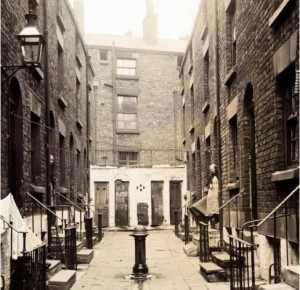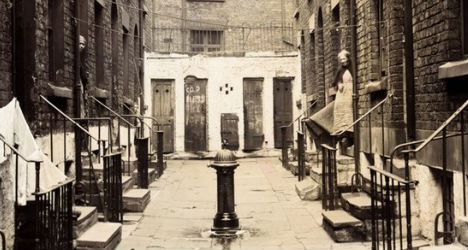
Anyone with an acquaintance with Victorian history as it’s been written since the late 1960s will be familiar with the idea of the Great Victorian Masturbation Panic. For reasons unknown, we are told, our nineteenth century forebears got it into their heads that masturbation was harmful – even fatal given time – and that they were driven by this belief into bizarre and oppressive behaviour of different kinds. Schoolmasters, sportsmen and imperialists were particular offenders.
There’s no doubt that masturbation had a bad rap in the Victorian, Edwardian and inter-War periods. When hasn’t it? But the theme has arisen in my own area of interest – British urban life 1860-1940 – and I’d like to address it briefly. Rather than embark on an extended argument, I’d like to suggest some context that, I think, puts it into a different light.
Origins
Although the idea of masturbation as bad for mental health can be traced back to the England of the seventeenth century, it existed then only in one or more very obscure tracts. The real kicking off point is Diderot’s Encyclopedie, and the pioneering work in mental health done by early nineteenth century doctors in Paris. It returned to England through the offices of young medics who’d gone to Paris to study under the greatest minds of the day and in the most advanced conditions. At a time when serious scientific medicine was in its infancy and psychotherapy even more so, the gap between the quack idea and solid thinking was narrow, but not in a way that was apparent at the time. Nevertheless, a Parisian expert who walks the wards daily is not the same as a crazed religious nutcase who wants to chain schoolboys to their beds at night in case their hands wander.
It isn’t clear how far through society what were new ideas from the best minds actually went. Without presenting you with an unwanted bibliography, I’ve come across plenty of doctors, clergymen and others who expressed their belief in the harmlessness of masturbation in writing. I think it’s significant that they named it specifically: a great deal of the evidence for the Masturbation Panic is less plainly spoken, and, as I’ll explain, they may not have been talking about masturbation at all.
Context
- Up to and including the 1860s, Britain was a hugely sexualized society. The prostitution levels far outstripped modern levels, sexual activity began young, and births out of wedlock were far higher at the beginning of the nineteenth century than they were at the end. One way of looking at the efforts of purity societies, churches, governments and police forces after 1860 to change this is as an attempt to desexualize society, or at least to dial it all down as much as possible. Why would they want to do this?
- Huge population growth and the growth of cities. We’re used to this now. The Victorians experienced both first, and had to cope with it as they went along. Literature is full of bewilderment at population growth. Who are all these people? What do they think? What do they want? Are they a threat? I’d emphasise at this point that I’m not saying that attempts to desexualize society took place to inhibit population growth – my point is that the Victorians had to cope with it, that it was disorientating, and that the sudden appearances of the biggest cities in the world since Byzantium (and so many of them, all at once) changes attitudes towards privacy – people behave differently in crowded places to thinly populated ones. Middle class thinkers thought, without evidence, that crowded working class conditions would lead to incest and the loss of childhood. Middle class thinkers still, without evidence, advance similar theories today. In fact, recent research seems to indicate the opposite – the more crowded it got, the more effort went into preserving dignity and privacy.
- Resurgent syphilis. We have forgotten – almost completely – just how awful syphilis was. There was no treatment. Until Charles Goodyear’s factories started pushing out condoms later in the century, there was little in the way of reliable, accessible barrier protection. Your children could inherit it from you. It was a threat to your mental health. It could lead to facial disfigurement. It had come back renewed in the 1820s, and cut a terrible swathe: if you were middle class, by the 1860s it would have passed close by. Put yourself in Victorian shoes and ask how you’d deal with it. Desexualizing society – fencing off sex – was just about the only even vaguely realistic option on the table. It became a military issue – STDs in the armed forces affected large proportions of Britain’s already small-by-European-standards armed forces.
- Religious reawakening. It preceded Darwin: surveys in the 1850s revealed that it was physically impossible for more than half of the British population to attend worship on Sundays. There weren’t enough churches or chapels – but the size of the deficit came as a shock. Then as now, religion “buys into” modern circumstances to further its own goals. But this was also the period when British Christians first became really interested in poverty and its causes and took on fresh and modern ideas and approaches to redefine its mission.
A Possible Scenario
We know that because syphilis had a long incubation period, a young man could acquire it unknowingly before his marriage. Once married, he could infect his wife, and his children. The shame of this would be bad now, let alone then, and with the increased desire for privacy amidst rapid population growth and overcrowded cities, it’s little surprise that syphilis was referred to indirectly, in code.
So we have a combination of factors working together. Population growth and the appearance in the land of vast cities, changing ideas about privacy, public behaviour and dignity. A terrible disease that has become hard to speak of, which can only be avoided through abstinence and marriage. An existing, heavily sexualized society with a high rate of extra-marital births, pushing men and women into the very behaviour that allows the disease to proliferate. The latest medical thinking ruling out masturbation, which might have provided some sort of solution. And the church had begun to care about the poorest in society, on whom all this fell heaviest.
I don’t know if this is how things proceeded. But if they did, we’re not looking at a masturbation panic. It’s primarily a syphilis panic, a fear of real disease and a justified one at that. If your sole weapon is to dial down the sexualization of society, where do you start? Where do you draw the line? From here, for me, the situation they found themselves in looks almost impossible, especially given the information they had to hand.
How Quickly Did It All Happen?
Often, as you’ll know, moral change obeys a flywheel effect: ideas that take hold under a certain set of circumstances take time to gain momentum, and often aren’t up to full speed until long after those circumstances have passed. We see it in modern politics: British right-wingers who formed their ideas in the 1970s and a state-corporatist, union-dominated economy, continue to press for the escalation of their solutions to that problem and present them as answers to every single turn of events that happens subsequently. The Bennites of thirty years ago behaved in a similar fashion.
So my final speculation is this: what if the anti-masturbation idea didn’t fully take hold until the second or third decade of the twentieth century? When condoms, and drugs, and solutions to overcrowding, and the host of neo-Gothic churches had already come on stream? Because by then, of course the idea would hang unsupported in the air, and look both ridiculous and vindictive. But like all ideas that have had the time to become eternal verities, it had that carapace around it that hinders criticism. It had the Victorian imprimatur: this is what they believed, and they conquered the world. They knew something we didn’t.. historical memory can be a strange thing.
What about the 1960s?
Frankly, it has suited historians to pigeonhole Victorians and Victorian things: the era existed to counterpoint the present and future as it seemed to younger 1960s academics. When the political aims were peace, the end of colonialism, sexual equality and sexual liberation, it made a kind of sense. In our period, when no analysis of our society exists that’s less than thirty years old, and when that analysis has just hit some almighty buffers, it’s harder to judge. The left and right wing flywheels are still spinning from the 1980s, and we don’t yet know what’s next. That might be one reason why more recent historiography has gone quieter on the Great Masturbation Panic: we don’t need it anymore. We used to need the Victorians to be oppressive anti-sexual madly-religious imperialist loons. Now that the need’s gone, all that starts to vanish into the air. And a different kind of Victorian emerges.
Edward Thring, headmaster of Uppingham School, was often fingered by the historians as one of the major criminals of the panic. I’ve read his letters and sermons, read his memoirs and the memoirs of him written by other men. Thring knew what threatened his pupils all right: he moved the entire school to the coast of Wales – an extraordinary and brilliant operation that saved the school – after the Uppingham drains were responsible for the death of a pupil from typhoid. The death shocked and sombered the whole community. His response was immediate and decisive. I can’t see him exercising himself over myths and maybes, and that’s perhaps why I can find no trace whatsoever of irrefutable masturbation panic in his writings or in the writings about him.

I gather that “keeping up with the Joneses” is not Victorian but American in origin. Ditto “stiff upper lip”. I also gather that the business of hiding the piano legs is bogus, having started as a satirical remark not a description of an observation. How much more of what we are told about the Victorians is balls?
Anyway, here’s a charming image I came across yesterday, concerning Lord Salisbury, the PM. At his country pile he took up tricycling, for the exercise. He’d go off accompanied by a “tiger” i.e. a boy servant dressed in livery. When they reached an upward slope that was too steep for the old fellow, the boy would help by pushing. When they reached the summit and were about to go downhill, the boy would climb aboard the back of the trike, put a hand on each Prime Ministerial shoulder, and off they’d go. Whee!!!!!
That’s wonderful. Makes you like Lord Salisbury, doesn’t it?
WKPD: In 1967, Clement Attlee … was asked who he thought was the best Prime Minister of his lifetime. Attlee immediately replied: “Salisbury”.